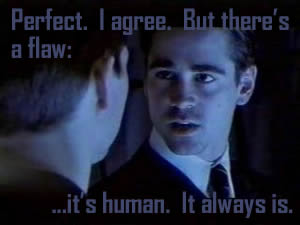Sickness. Annoyance. Frustration. Desolation. Despondency.
I don't know any other way to describe these more recent studies of Utopia in simple terms. 1984 gives a bleak warning of what would happen if we lost any individuality and ability of free thought, while Brave New World gives a similar warning to (how I comprehend it) a thoughtless, senseless state of sex and pleasure. The two books contrast each other very heavily, so I'll start with my impressions of 1984 and pick up next time with our dystopian films Gattaca and Minority Report.
The thing I can't seem to push out of my mind with this book is the ultimate lack of any assemblance of free will. Our protagonist, Winston, finds himself in a constantly escalating series of steps that eventually allows Big Brother to confirm his thought crime and catch both he and his lover, Julia, in the process.
Yet, the Ministry of Love (which believes that for whatever ridiculous reason that making a person love Big Brother before they're executed) can stop any and all desires for rebellion or individual thought.
These people committed a "thought-crime", and now they
love Big Brother. They were wrong to hate him in the first place, and sees the execution of the criminal as a suiting punishment. The party redirects any hate towards terrorists and towards Eurasia (oh wait, no I mean Eastasia). Nobody is capable of realizing that the shoddy, worn down buildings of the former UK is the result of negligence on the part of Party? What?
THAT's what I find ridiculous! How can you just accept that these people are complacent. Is their fear of Big Brother really that powerful that nobody has thoughts of insurrection against their tyrannical government?
Now, I anticipate that your initial thoughts are, "Yes, of course! Their Thought Police and systems of surveillance prevent any uprising. Duh." I still disagree. Fear is a powerful tool, but the desire for freedom is easily taught at birth, and shines as a single, solemn flame, waiting to grow into a blaze that stomps out oppression. The French were able to do it. We were able to do it. It's happening now, even as their respective governments try to quell rebellions. No government, no matter how large, can keep all of its members in check. Nor can it modify thoughts of free thinking individuals. Granted, brainwashing is real and effective, but any person with an extreme dispassion towards this government is unlikely to have their mind changed.
Even Patrick Stewart, in his supreme manly classiness, was able to assert that after days of torture that there are indeed four lights.
Afterwards, he said that, for a split second, he began to see five, but the commentary ignores the basic human desire to want. Whether or not Winston or Jean Luc Picard was brainwashed, their basic desire to want (and the corresponding dislike to being denied a desire) would eventually lead to the same unrest that got Winston into trouble in the first place. 1984 present no, "what happened 10 years from then". It presents the future as grim, however it ignores that no governance (especially the laws surrounding it) is permanent. After the New Deal, we adopted borderline socialistic systems to protect our citizens. At that time, our government changed its form. We were no longer part of a capitalist federal government, but more of one closer to a socialist federal government.
So, my point is that, even though George Orwell forecast a dim future for man, many people (even from the time of the Romans) predicted the downfall of man and society, yet here we are today. Human desire, in its base form, will always fuel the drive for change and freedom. It can happen overnight like some revolutions, or over the period of decades.















.jpg)
.PNG)





